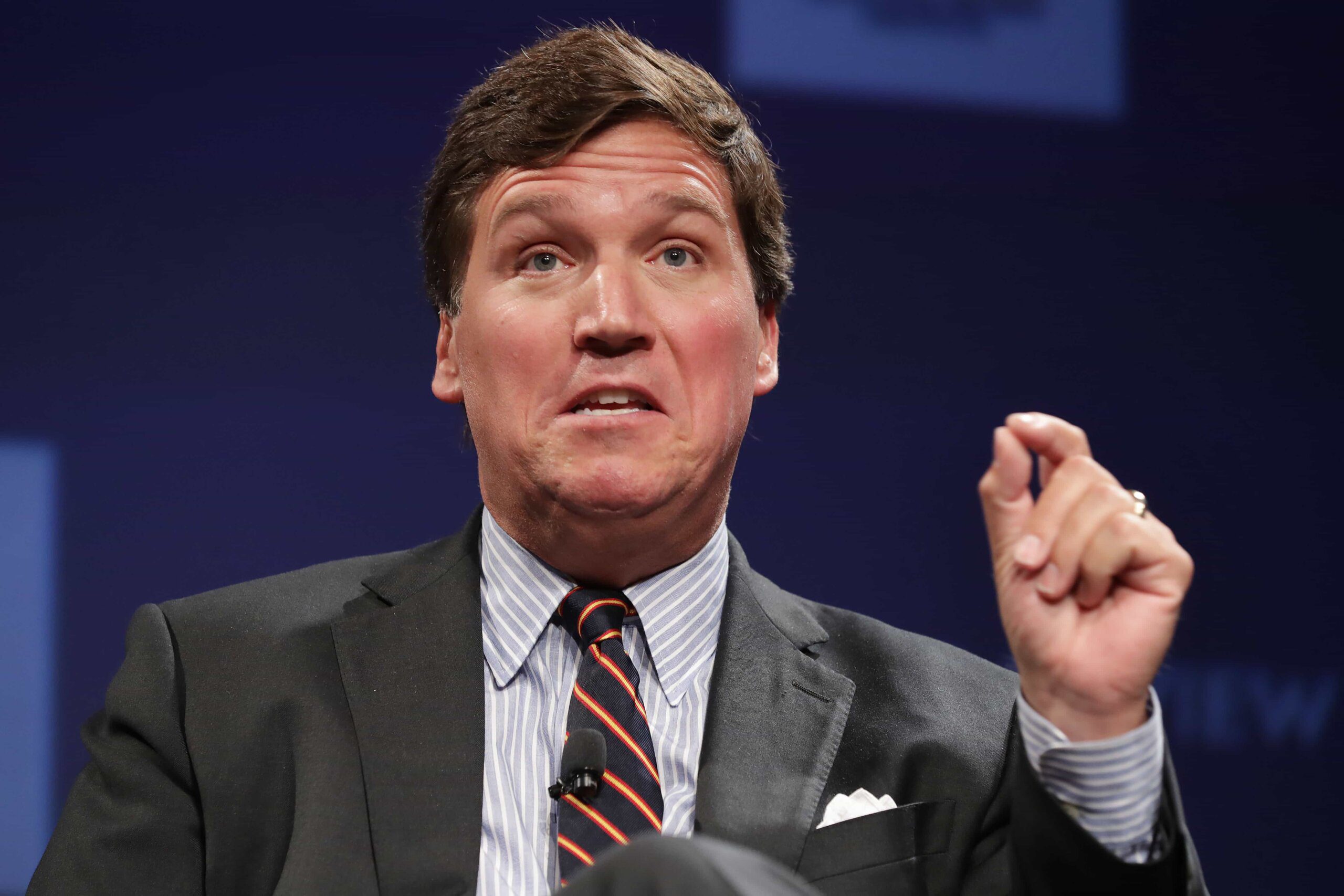Another Monday, another news cycle … welcome back to Xtra’s weekly roundup, where we’ve got the six biggest hits in LGBTQ2S+ news. Grab your morning coffee, open up your laptop and dig into the quick news we’ve put together for you this Monday.
1. Tucker Carlson is out (and not in the gay way)
2. Majority of Scottish schools have signed up for LGBTQ+ inclusivity scheme
3. Hungarian president vetoes controversial anti-LGBTQ+ law
4. Tokyo Rainbow Pride returns
5. A new report says books with LGBTQ2S+ themes are the most likely targets of U.S. library bans
6. Community and stars came together for the 2023 Los Angeles LGBT Center Gala
1. Tucker Carlson is out (and not in the gay way)
Notoriously far-right anti-LGBTQ2S+ commentator Tucker Carlson is parting ways with Fox News; his last show aired Friday, according to the network. The move comes in the wake of a $787.5 million settlement in a defamation lawsuit filed against Fox by Dominion Voting Systems, over the network’s baseless fraud claims in the 2020 elections.
Over the course of his time as a host on his nightly political talk show, Carlson repeatedly used his platform to stoke anti-LGBTQ2S+ hate—from claiming that trans people are the “natural enemy” of Christianity in the wake of the Covenant School shooting in Nashville, to calling trans kids “grotesque” and a “nationwide epidemic,” to repeatedly spreading misinformation about gender-affirming care, and so much more (GLAAD’s Accountability Project has compiled a handy-dandy list, if for some reason you want to know more). Carlson’s hatred goes beyond the queer community, though—he is well known for echoing white supremacist talking points and endorsing anti-vax conspiracy theorists. Let’s hope he’s off the airwaves for good this time.
2. Majority of Scottish schools have signed up for LGBTQ+ inclusivity scheme
The organization LGBT Youth Scotland has been working to provide local schools with specific training to ensure equality and safety for queer students across the country. A new charter developed by the org has been accepted by 212 out of Scotland’s 357 high schools, meaning nearly 60 percent of schools have adopted the policies.
The scheme, which aims to reach 75 percent of schools over the next year, requires schools to follow a 12- to 18-month period of accreditation, wherein an expert from LGBT Youth Scotland helps implement policies and training, as well as evaluating the entire process.
Organizers are now hoping more schools located in the very north of the country will sign up for the scheme—right now, there are three Highland schools that have completed the program.
“With over half of Scottish secondary schools participating, this represents a significant commitment from Scottish educators to LGBT inclusion,” said Ali Kerr, head of partnerships at LGBT Youth Scotland. “We hope more Highland schools will take inspiration and get in touch with us to learn more.”
3. Hungarian president vetoes controversial anti-LGBTQ+ law
Hungarian president Katalin Novák has rejected a new law that would have restricted the rights of LGBTQ+ people in the country. Typically, Novák is loyal to Prime Minister Viktor Orbán, who vocally supports the legislation. Her rejection of the bill prevents it from being written into law.
The bill would allow citizens to report same-sex families to the government anonymously for breaching “the constitutionally recognized role of marriage and the family.” It was approved in draft form earlier this month, but on Friday Novák sent it back to Parliament, stating that the bill “does not strengthen but rather weakens the protection of fundamental values.” She ultimately argued that the vaguely worded directives in the bill would increase distrust in the community.
Legislators can override Novák’s veto, though it’s typically unusual.
4. Tokyo Rainbow Pride returns
This weekend saw the return of Tokyo’s Rainbow Pride, which was back in full swing for the first time in four years.
Around 10,000 people gathered on the streets of Tokyo’s Shibuya district, celebrating Pride and also calling for the Japanese government to do more to protect LGBTQ+ citizens. One attendee said they hope the government can offer more than performative remarks, as well as recognize queerness more publicly.
“I think the government is both pretending to see us and pretending not to,” they said. “Japan is really far behind … we will fight until the entire country has same-sex marriage.”
Some attendees were critical about the over-corporatization of the day, with one Twitter user noting that it was “baffling” to see the majority of stalls be major corporations instead of independent vendors.
5. A new report says books with LGBTQ2S+ themes are the most likely targets of U.S. library bans
The American Library Association (ALA) has today released their list of the 13 most challenged books of 2022, documenting the top controversial titles that have been targets of book-banning efforts.
Typically, the ALA releases a “highly anticipated” list of the top 10 most challenged books of the year, but this year with an uptick in censorship efforts, the list has been expanded to 13 titles. The list has been released on Right to Read day, ALA’s Office for Intellectual Freedom’s initiative to protect citizens’ freedom to read.
Multiple books received the same number of challenges, meaning that more made the cut. For the second year running, Maia Kobabe’s Gender Queer topped the list. The book, an autobiographical graphic novel, charts Kobabe’s gender journey in illustrative form.
Other notable titles on this year’s list include John Green’s Looking for Alaska, Jesse Andrews’s Me and Earl and the Dying Girl, Toni Morrison’s The Bluest Eye and The Perks of Being a Wallflower by Stephen Chbosky.
“By releasing the list of Top 10 Most Challenged Books each year, ALA recognizes all of the brave authors whose work challenges readers with stories that disrupt the status quo and offer fresh perspectives on tough issues,” said ALA president Lessa Kanani’opua Pelayo-Lozada in a press release this Monday. “The list also illustrates how frequently stories by or about LGBTQ+ persons, people of colour and lived experiences are being targeted by censors. Closing our eyes to the reality portrayed in these stories will not make life’s challenges disappear. Books give us courage and help us understand each other.”
6. Community and stars came together for the 2023 Los Angeles LGBT Center Gala
The Los Angeles LGBT Center threw its annual gala at the Fairmont Century Plaza hotel this weekend, honouring two stars with the Vanguard Award for their work. This year, Keke Palmer and Pamela Anderson took home the award, which paid tribute to their contributions to LGBTQ2S+ activism.
Anderson thanked the Center for the recognition, stating, “I am rooting for you. Thank you for rooting for me.”
Palmer also opened up about what the award means to her. She said that she feels like she is “a little bit of everything.
“I’m so grateful to be here today to be embraced by a community that I’ve always felt accepted by and a part of,” she said. “I’ve always been my own person. Sexuality and identity for me has always been confusion. You know, it’s, ‘I never felt straight enough. I never felt gay enough. And I never felt woman enough. I never felt man enough.’”


 Why you can trust Xtra
Why you can trust Xtra


